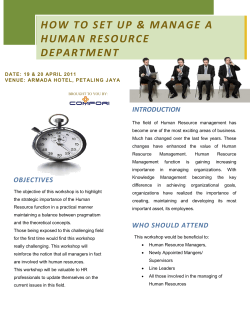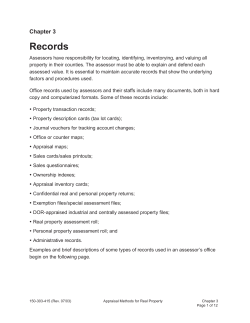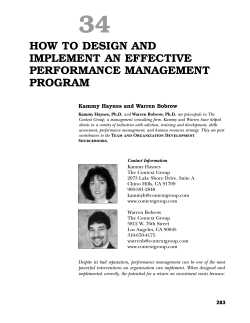
ow to: Be an Active Appraiser Trevor Austin Medical Education @ Cardiff
ow to: Medical Education @ Cardiff Be an Active Appraiser Trevor Austin The introduction of re-validation presents additional challenges and opportunities for doctors appraising the work of other doctors, making appraisals more significant and demanding than ever. It is crucial that appraisers are well prepared, plan ahead and are ‘active’ through the appraisal process. Background “My job is to help the doctor think and to hold up a mirror so that they can see themselves more clearly.” Re-validation will mean that all doctors will need to be appraised to meet the requirements set out in ‘Good Medical Practice’1. Deaneries will provide materials and tools to support the process overall but appraisers will need to be clear how the GMC requirements can be demonstrated and how they can structure and facilitate a good appraisal. An appraisal is defined as a formal, regular, developmental process, providing an opportunity to review and reflect upon performance in the workplace, to identify development needs and to set objectives. The need for an appraisal to encompass both the performance and the further development of a doctor2, means managing the tensions between these aspects but also seeing how each informs the other. An active appraisal should also be seen as a process rather than an event and be sustained by ‘twoway’ rather than ‘one-way’ communication. It is different from work planning and is not a form of assessment. It is evidence-based. Preparing to appraise A successful appraisal rests on sound preparation. Appraisees prepare a portfolio around the domains identified in the framework for appraisal in Good Medical Practice. The framework consists of four domains: 1. Knowledge, skills and performance Consultant Paediatrician Appraiser 2. Safety and quality 3. Communication, partnership and teamwork 4. Maintaining trust An active appraisal also requires Appraisees to think about the context of their practice as well as the practice itself. Appraisers should be asking what has helped or hindered the Appraisee’s work; what are they proud of and explore any difficulties they may have faced in their work. Preparation also requires the appraisee to become familiar with an online appraisal toolkit and to start collecting supporting information in line with the domains set out above. It is also useful for the appraiser to ensure that their appraisee actively reviews their job description, current work, previous developmental objectives and how they have developed personally and professionally over the review period. Structuring the appraisal Following-up There is no set template with which to plan and structure an appraisal. The following model suggested by the London Deanery can help in thinking through the performance and developmental aspects of an appraisal. Appraisers might start with the achievements of an appraisee and work towards areas that may have gone less well before concluding with future professional development. The whole cycle would be followed for each of these aspects. Different questioning strategies will be required at each stage of this cycle with open questions at the start and more closed ones to check understanding later on. Appraisal should help to identify learning needs and key questions to ask are: Skills for appraisal In addition to knowing the Appraisee’s work, key skills for Appraisers are: 1. Questioning: There are large number of models and strategies available such as the ‘funnel’ approach. Questions should be varied (open, closed, probing) with time allowed for full and reflexive responses. 2. Feedback: It is crucial that feedback on performance is given and this needs to be constructive and clear. Good feedback often improves when a model such as Pendleton’s ‘Rules’ is used. 3. Listening: Active listening is all about showing a response to what is being said. Listening requires effort combined with a real wish to understand. 4. Facilitation: This means creating an environment where an appraisal is defined by a two-way conversation. Also, the appraisee does most of the talking and has time to reflect and respond. Responses to skilful and varied questioning combined with reflection, will help to develop further insight. What does the Appraisee want to do better? How will they recognise success? How will they access help with their development? How will they apply what they have learned? Remember, the workplace offers at least as many opportunities for development as going on courses. Learning objectives need to be Specific Measurable Achievable Realistic and Timed! These objectives need to be recorded in an agreed PDP (personal development plan) which will need to be reviewed and require Appraisees to maintain and further develop their skills. Summary Being an active appraiser is very challenging in terms of knowing a doctor’s work well enough to appraise them effectively. It also requires a set of skills that need to be developed and applied well in a complex system and in the context of an individual doctor’s career development. Being ‘active’ means bringing these skills and principles together. Being an active appraiser means encouraging and facilitating a process whereby a wide range of information can be analysed and reflected upon in a confidential discussion. Allowing a doctor to “stand back” from their own practice and to see it anew requires an informed, skilled and thoughtful approach. These are the qualities that constitute an active appraiser. Further Information NHS (2013) Medical Appraisal Guide - a guide to medical appraisal for revalidation in England. London: NHS GMC (2013) Good Medical Practice. London: GMC GMC (2012) The Good Medical Practice Framework for appraisal and revalidation. London: GMC http://www.londondeanery.ac.uk/professional-development/appraisal-and-revalidation-support (accessed 21/3/13) Taylor, C, Wall, and Taylor, C (2002) Appraisal of doctors: problems with terminology and a philosophical tension. Medical Education 2002;36:667–671 Interested in learning more about this and other educational topics? Why not professionalise your role with an academic qualification at PGCert, Dip or MSc in Medical Education via e-learning or attendance courses. Trevor Austin is a lecturer in Medical Education in the School. Contact: medicaleducation@cardiff.ac.uk Series Editor: Dr Lesley Pugsley, Medical Education, School of Postgraduate Medical and Dental Education, Cardiff University. Wales Deanery Cardiff University, 9th Floor, Neuadd Meirionydd, Heath Park, Cardiff CF14 4YS Tel: +44 (0)29 2068 7451 Fax: +44 (0)29 2068 7455 E-mail: medicaleducation@cardiff.ac.uk ISBN: 978-1-907019-52-4
© Copyright 2025





















